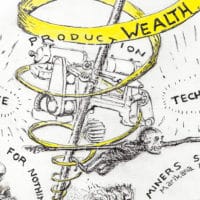-
Imperialism in a coffee cup
Why is it that just 1p of a £2.50 cup of coffee goes to the farmer who cultivated and harvested the coffee beans?
-
The debate over inequality
The debate over inequality has become hotter world-wide. While Trump had introduced substantial tax cuts for the rich in 2017, and Britain’s Boris Johnson, the front-runner to succeed Teresa May, has promised to do the same if he becomes Prime Minister, there are strong proposals for taxing the rich which have also been mooted. Bernie Sanders had such a proposal for the U.S. during the time that he was seeking the Presidential nomination of the Democratic Party.
-
How working-class movements are moving beyond the confines of capitalism
The context for organizing today that faces working people across the world is one that must grapple with the challenges posed by a decentralized production process and a well-organized ruling class.
-
Numbers crushing working people
It is vital that working people know the score. Only by accurate and complete economic representations can an informed electorate pursue political strategies and tactics that benefit all working people.
-
Dossier 18: The only answer is to mobilise the workers
Tricontinental: Institute for Social Research launches its eighteenth dossier, “The Only Answer Is to Mobilize the Workers.” The challenges facing Indian workers and their strategies to fight back are explained through the insights and expertise of K. Hemalata, president of the Center of Indian Trade Unions (CITU).
-
Portrait of the 2009-2019 U.S. expansion
June 2019 marks the 10th anniversary of the current U.S. economic expansion. If it makes it through July it will surpass the 1991-2001 expansion as the longest on record. But while expansions are to be preferred over recessions, there are many reasons to view this record-breaking expansion critically. In fact, the nature of this expansion, hopefully captured in the following portrait, highlights the growing inability of the U.S. economic system, even when performing “well,” to meet majority needs.
-
Notes on Marx’s “General Law of Capitalist Accumulation”
Chapter 25 of Karl Marx’s, Capital, vol. 1 (“The General Law of Capitalist Accumulation”), not only explains the working conditions of the world’s peoples today; it also explains the conditions of our whole existence. Marx’s general law is nothing less than the lever upon which all our lives now pivot.
-
An Analysis of the 2019 Oakland Teachers’ Strike
The recent seven-day strike by the Oakland Education Association (OEA) was eerily similar in key ways to its 26-day strike in 1996. What happened in both cases was that union members and community allies won on the picket lines and in the streets but got a draw, at best, at the bargaining table.
-
Traditional measures of unemployment are missing the mark
We’ve heard it countless times in recent media accounts: The economy is at “full employment.” The most recent jobs numbers, out the first week in May, show the official unemployment rate, and applications for unemployment benefits are at a 50-year low. The last time a recovery was able to push the unemployment rate to these […]
-
Making excuses for unemployment: The myth of a “skills gap”
The current labor force participation rate of prime age workers, those 25-54 years, is a case in point. It remains below the previous peak rate in 2008, and even further below the peak rate at the turn of the century. We would need an additional 1.2 million employed prime age workers to match the 2008 labor force participation rate and 2.5 million more to match the turn of the century rate. Still it appears that at the present moment unemployment is no longer a major political issue.
-
PepsiCo and Monsanto’s bogus court cases are war on Indian farmers
At the heart of the struggle is capital’s need–Monsanto and Pepsico’s–to continuously enclose spheres and generate surpluses from creating a monopoly over something that it does not actually own.
-
Precarious work: a Marxist explanation
The casualisation of work is no aberration of capitalism. It is the logical outcome of a system based on profit. Precarious work is the product of processes within capitalism that Karl Marx described over 150 years ago.
-
‘Unions must provide political education or labor will find itself more powerless than ever before’—Timir Basu on labor in India
The phenomenal growth of the services sector has created a new generation of employees. For these workers, May Day has very little meaning—what they fail to grasp is that they cannot protect their future without knowing their past.
-
‘A fully automated society is science fiction’—Michael D. Yates on the state of U.S. labor
Monthly Review Press editor Michael D. Yates reflects on the state of U.S. labor in this special May Day interview conducted by Farooque Chowdhury.
-
‘Facebook Coin’: The media giant is trying its hand at banking
Facebook’s cryptocurrency initiative furthers an agenda of neoliberal financialization, writes Josh Gabert-Doyon
-
Ecosocialism: For a fighting ecological trade-unionism
How can we reconcile social struggle and environmental struggle? This question poses problems for trade unionists.
-
Imagining the Green New Deal with Robert Hockett
In this episode, we speak with Robert Hockett, Edward Cornell Professor of Law at Cornell Law School. At Cornell, about his role in crafting the Green New Deal Resolution, his conception of finance as a franchise, and his experience as an advisor to Congresswoman Alexandria Ocasio-Cortez as well to Senators Sanders and Warren.
-
A new unionism for the twenty-first century
As we contemplate the ongoing decline of British trade unions, and as Americans consider their next move after the Supreme Court’s Janus vs AFSME decision, the the Independent Workers of Great Britain (IWGB) and United Voices of the World (UVW) point towards an alternative way of organising, fighting—and winning.
-
Marx and the democratization of work
The solution for capitalism’s problems requires transforming the capitalist workplace into democratic institutions where everyone has an equal say on what happens there.
-
Marx imagined a totally asexual worker
Silvia Federici is one of the most important feminist thinkers of our time–anyone looking for profound analyses of the role of housework, violence against women, or the importance of control over the body in capitalism inevitably encounters her writings.




















